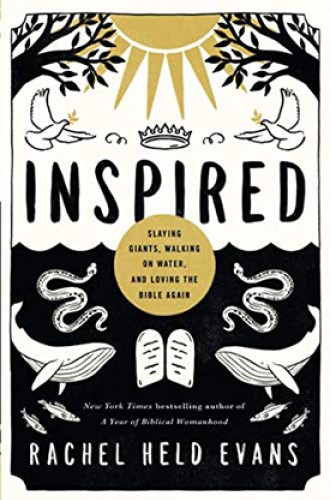How Rachel Held Evans bears the beauty and the burden of reading the Bible
The creative retellings in Inspired model an account of inspiration that is as much a spiritual practice as a religious doctrine.
Six years ago, Rachel Held Evans published a best-selling memoir about her attempts to take the Bible’s teachings on women literally. A Year of Biblical Womanhood offered a comic reflection on what it means for modern women to engage critically with the Bible’s admonitions that women cover their heads in prayer, separate themselves from their households during menstruation, and call their husbands “master.”
A few books later, Evans returns to the subject matter of her first book—not to camping in a red tent per se, but to the underlying questions about inspiration and authority that animated her year-long experiment with biblical literalism. While the former book took up interpretive questions about the Bible’s legal and epistolary teachings, Inspired emphasizes the Bible’s narrative tradition by examining biblical stories, our own stories, and how the two meet and part over the course of a lifetime. Like Macy Halford’s memoir about her lifelong relationship with Oswald Chambers’s My Utmost for His Highest, Inspired tells the story of a life lived with a book. As Evans’s story moves through stages of enchantment and estrangement, she charts her path back to the Bible, leaving breadcrumbs along the way to help readers similarly estranged find their own way back.
Read our latest issue or browse back issues.
The question behind Inspired is one that many readers who have aged with the Bible will find painfully familiar. What do we do when the childhood wonder ebbs away, when we are left with our disquieting questions about the unnamed concubine torn to pieces in Judges, the foreign women sent out to die in the desert in Ezra, or the prejudice Jesus evinces toward the Canaanite woman in Matthew? How do we keep on reading when our experience of these stories as adults seems a faint shadow of the narrative world that was once so powerful and yet familiar? In the words of Robert Frost’s glum oven bird, what to make of a diminished thing?
Evans makes her way back to “loving the Bible again” not by setting her questions aside but by learning to see how similar questions animate the biblical writers’ own attempts to tell stories about beginnings and wars and walking on water. She encounters the provocations of these stories in new ways by reading over the shoulders of other readers, drawing on the work of those who have practiced wrestling with the interpretive difficulties of this narrative tradition, from womanist scholars to Jewish exegetes.
Evans’s account of the inspiration of scripture envisions writers and storytellers on both sides of the text. “True inspiration comes not to the lucky or the charmed but to the faithful,” she writes, to the ones who show up day after day “to wrestle with the mystery until God gives us a blessing.” The inspiration of these words is not something readers passively receive but is instead “a collaborative process, a holy give-and-take, a partnership between Creator and creator.”
That collaboration is visible not only in Evans’s exegetical reflections on the various kinds of storytelling we find in the Bible but in the interspersed literary chapters in which she creatively reimagines her way into the stories: rewriting the book of Job as a screenplay, the story of Hagar as a monologue, and the narrative of Jesus walking on water as a “Choose Your Own Adventure” story. While readers’ aesthetic appreciation for these chapters may vary, Evans’s creative retellings model an account of inspiration that is as much a spiritual practice as a religious doctrine. “We are storytelling creatures because we are fashioned in the image of a storytelling God,” Evans writes—we create with words as we were first created.
Inspired is a good reminder that the burden of the most difficult questions about the Bible’s inspiration falls on the shoulders of its readers in an uneven way. Readers who have experienced the blunt force of what Phyllis Trible once called “texts of terror” from the underside—those whose own lives lead them to identify with the foreigner, the slave, the subjugated—wrestle with questions about the Bible with a different kind of urgency. Last semester, I taught an undergraduate seminar on biblical narratives of sexual assault, domestic violence, and the misuse of power. In the voices of so many of my female students, I sensed their struggle to see themselves in the images of so many unnamed victims in scripture, even as their religious convictions press them to uphold the text as holy, a witness to the goodness of God.
Too often, the burden of that struggle falls on the shoulders of those who are terrified by these texts, while those at some distance from stories of rape or racialized violence read the same stories as spiritual metaphors or moralizing tropes. While these latter readers may champion inerrancy as the shibboleth of Christian faith, Evans points to the need for a different conversation about the inspiration of scripture—one generated by the wisdom of those who wrestle with the God who sent Hagar back to her abusive master, those who struggle with Paul’s injunction for women to keep quiet, those who read the text with fear and anger and trembling and somehow go on reading.







